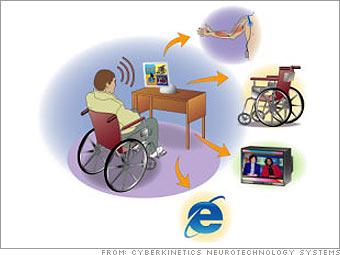
 |  | 2 of 4 |
Brain power: help for quadriplegics
Cyberkinetics Neurotechnology Systems
The medical-device firm's BrainGate device, an aspirin-sized cranial implant, allows quadriplegics to move a cursor around a computer screen merely by thinking about it. In the future, such technology could allow quadriplegics to move their wheelchairs solely using their thoughts.
In July 2006, the company's first trial patient, a quadriplegic named Matthew Nagle, was featured in a cover story in Nature. Cyberkinetics recently announced results for a subsequent test involving three spinal-cord patients and a fourth with amyotrophic lateral sclerosis (ALS, or Lou Gehrig's disease), one of whom was able to maneuver a wheelchair.
Similarly, CNS acquired another technology that promises to restore sensation and movement by stimulating growth in a damaged spinal cord. A ten-patient trial of the technology has already returned positive results, and an enhanced version (for older injuries) is now being tested in dogs. Since FSB wrote about the company, it has raised $27 million from investors and now has 36 employees.

